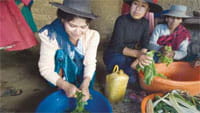In the mountainous area of Chuquisaca, central Bolivia, communities are discovering the nutritional benefits of vegetables. The traditional meal for the indigenous Quechua people was a hot broth made from wheat and potatoes until SETESUR (Seminario Teológico del Sur) started the Yanapanakuna project in six small isolated communities. The word yanapanakuna means ‘let us help ourselves’ in the Quechua language.
Malnutrition is a serious problem in Bolivia, especially in children and elderly people. This is due to a basic diet of potatoes and wheat, and poverty which limits people’s ability to buy other types of food. Frequent illness also contributes to malnutrition. Around 27 per cent of Bolivian children under the age of five suffer from chronic malnutrition.
Yanapanakuna works for three years in each community. After that time it is hoped that the community can continue the work without help from SETESUR. The exact work varies from one community to another but in all the communities the work focuses on:
AGRICULTURE This might include: training community promoters in organic and intensive agriculture, animal health and environmental conservation; constructing greenhouses for planting fruit and vegetables; repairing and constructing irrigation systems.
HEALTH This might include: training community promoters in basic community health care, management of medication, nutrition and malnutrition, vaccinations, first aid and HIV prevention; constructing toilets; improving water supply; providing courses in family planning and sexual health.
WOMEN’S EMPOWERMENT This might include: training in basic health care, sexual and reproductive health, nutrition, textile production for use or sale and women’s rights and responsibilities; providing literary courses.
SPIRITUAL GROWTH This might include: organising meetings for worship, Bible study and prayer, with special meetings for children; training community leaders about growth and sustainability of the church.
Through these activities, the health and nutrition of the poorest people in Chuquisaca is improving. They no longer eat mainly wheat and potatoes, but enjoy a more varied diet including fruit and vegetables. Their immune systems are being strengthened, their ability to concentrate has improved and illnesses are less common.
Through the spiritual work of the Yanapanakuna project people are learning about the relationships between God, man, woman and the earth. Alcoholism and domestic abuse are becoming less frequent as there is more dignity and respect within communities.
In 2009 Yanapanakuna will start a new three-year cycle. The new communities will benefit from the lessons learnt in past cycles and emerging issues such as climate change will also be considered during planning.
Pastor Eduardo Barja is Director of SETESUR, Calle Sargento Tejerina No 101, Esq. Pando, Casilla 201, Sucre, Bolivia.
Email: [email protected]
CASE STUDY
My name is Paulina Vedia. I am married to Máximo and we have five children. In the past I looked after my children and the animals. Some days were very difficult as we did not have enough food. After school my children would have to go out to work to earn money for the family.
Since the Yanapanakuna project my life has changed. My husband and eldest son attended the training courses. Now I get help from them because their attitude towards the family has changed. They built me a kitchen which has made cooking easier. They are helping the neighbours to do the same.
We can now eat vegetables that my son grows. We especially like to eat lettuce with a little salt and oil but my favourite is silver-beet [chard].







